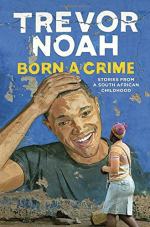
|
| Name: _________________________ | Period: ___________________ |
This test consists of 15 multiple choice questions and 5 short answer questions.
Multiple Choice Questions
1. Why was the author unable to play with his cousins when he was very young?
(a) His grandmother was afraid the police would take him away.
(b) His grandmother was afraid the cousins would be a bad influence on Trevor.
(c) His grandmother was afraid the neighborhood children would steal him.
(d) Trevor was being punished.
2. How did arguments between the author and his mother change after the author turned eight?
(a) They began to argue in writing instead of in person.
(b) They stopped arguing altogether.
(c) Their arguments became nastier and more personal.
(d) They started arguing about more mature topics.
3. Who was the most consistent male figure in the author's life growing up?
(a) His father, Robert.
(b) His uncle, Dinky.
(c) His grandfather, Temperance.
(d) Nelson Mandela.
4. Why did the author think it was ironic when a black security guard was convicted of animal abuse for killing a cat on live TV?
(a) The author believes cats would do much worse things to humans if they were in charge instead.
(b) The security guard came from a long line of cat breeders.
(c) White people were horrified by the animal abuse yet were silent about violence against black humans during apartheid.
(d) Traditionally, security guards in South Africa keep cats as helpers.
5. Which racial group was most common in Soweto, according to the author?
(a) Indian people.
(b) Black people.
(c) Soweto was fully integrated.
(d) White people.
6. What crime did the author's parents commit when they had him?
(a) They each had intercourse with a person of another race.
(b) They illegally crossed the border to have him in Swaziland.
(c) They kidnapped him from his real parents.
(d) They hired an off-the-books midwife to deliver him.
7. What did the author say he had learned about Robert after they spent the weekend together?
(a) He learned that Robert was wise.
(b) He learned that Robert was humble.
(c) He learned that Robert was secretive.
(d) He learned that Robert was a jerk.
8. At the end of the foreword to the story "Born a Crime," the author wrote that apartheid would be easy for occupants of which country to understand?
(a) Nigeria.
(b) Costa Rica.
(c) America.
(d) England.
9. What did Robert show the author after the author tracked him down in Cape Town?
(a) An old family photo album of Robert's past.
(b) A forged birth certificate accurately listing Robert as the author's father.
(c) A photo album tracking the author's career.
(d) A shiny new car.
10. Who was the only member of the author's family who was willing to use corporal punishment on him?
(a) His aunt.
(b) His mother.
(c) His grandmother.
(d) His father.
11. Why was the author not allowed to eat food when visiting Temperance Noah's second family?
(a) Temperance's second family was too poor to buy food.
(b) Patricia was worried that Temperance's second family would try to poison them.
(c) Patricia wanted to show off her own cooking skills instead.
(d) Temperance's second family was full of bad cooks.
12. How did the author respond when he found out that he could not take communion because he was not Catholic?
(a) He asked if Jesus, being Jewish, would also be denied the right of communion.
(b) He called the owners of the school racist.
(c) He converted to Catholicism.
(d) He apologized for the misunderstanding.
13. What does the author indicate would probably happen if a black man had sex with a white woman under the apartheid system?
(a) The white woman would probably be charged with rape.
(b) The black man would probably be charged with rape.
(c) The police would not care at all.
(d) The police would probably let them off with a warning.
14. According to the author, how do white people treat dogs in South Africa?
(a) They treat them like tools.
(b) They treat them like alarm systems.
(c) They treat them like peers.
(d) They treat them like children.
15. Who did the author forget was in the house when he defecated on the newspaper?
(a) Koko.
(b) Nombuyiselo.
(c) Frances.
(d) Temperance.
Short Answer Questions
1. In what country did the author grow up?
2. Who taught Patricia how to navigate Johannesburg without being deported to the Bantustans?
3. Why was the author unable to call his father "dad" growing up?
4. What made the author "realize [he] was black" (59)?
5. What predominately Zulu political group violently opposed the African National Congress after the end of apartheid?
|
This section contains 781 words (approx. 3 pages at 300 words per page) |

|




